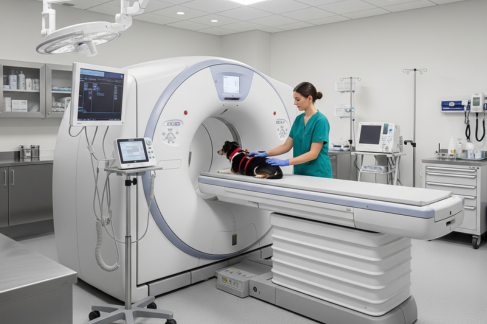Advancements in veterinary technology have revolutionized the way veterinarians diagnose and treat illnesses in animals. Among these tools, the CT (Computed Tomography) scanner stands out as a powerful imaging method that allows for precise, non-invasive internal examinations.
In Maryland, where pet owners are increasingly seeking specialized care, veterinary CT scanners are playing a critical role in diagnosing complex pet conditions quickly and accurately.
What Is a Veterinary CT Scanner?
A veterinary CT scanner is a specialized medical imaging device that combines X-rays with computer technology to produce detailed cross-sectional images of an animal’s body. Unlike traditional X-rays that provide only a flat, two-dimensional image, CT scans offer a 3D view, allowing veterinarians to examine bones, organs, blood vessels, and soft tissues with exceptional clarity.
CT scanners for pets are adapted versions of those used in human medicine, adjusted for the size and anatomy of animals. These scanners help detect abnormalities that might not be visible through other imaging techniques such as radiographs or ultrasounds.
Diagnosing Complex Conditions with Greater Precision
Many pet health issues are difficult to identify due to overlapping symptoms or internal damage that cannot be seen externally. CT scanning is especially valuable in diagnosing the following complex conditions:
Neurological Disorders
CT imaging is commonly used to evaluate pets showing signs of neurological issues such as seizures, loss of balance, head tilt, or sudden paralysis. In Maryland, veterinary neurologists rely on CT scans to detect brain tumors, skull fractures, spinal cord compression, and congenital abnormalities. This technology helps pinpoint the exact location and cause of the problem, which is essential for planning treatment or surgery.
Cancer and Tumor Evaluation
Detecting and staging cancer in pets can be particularly challenging. A CT scan allows for high-resolution images that show the size, shape, and exact location of tumors. It also helps assess whether the cancer has spread to surrounding tissues or distant organs. In Maryland, many veterinary oncologists use CT scans to guide biopsy procedures, surgical planning, and radiation therapy.
Orthopedic Injuries and Bone Conditions
For pets with persistent lameness, trauma, or suspected fractures that are not visible on X-rays, CT scanning offers a much clearer view. It can detect tiny bone fragments, joint injuries, and structural deformities. This is especially important for performance animals and aging pets in Maryland who are more prone to musculoskeletal issues.
Nasal, Dental, and Sinus Problems
Chronic nasal discharge, sneezing, and facial swelling can be signs of nasal tumors, foreign bodies, or dental infections. CT scans provide excellent imaging of the skull, sinuses, and dental structures, revealing the cause of symptoms that are otherwise hard to diagnose. In many Maryland veterinary clinics, CT imaging is a go-to tool for dental specialists handling complex oral cases.
Thoracic and Abdominal Disorders
CT scans are extremely useful for assessing the chest and abdominal cavities. They help identify lung diseases, heart abnormalities, liver and kidney issues, and gastrointestinal obstructions. Unlike traditional X-rays, CT imaging can differentiate between overlapping structures, making it easier to locate abnormalities in crowded anatomical regions.
Minimally Invasive and Fast Imaging
One of the significant advantages of CT scanning in pets is its speed and non-invasive nature. Most scans can be completed within minutes. While general anesthesia or sedation is usually required to keep the pet still during the scan, the actual procedure causes no pain and is very safe when performed by experienced professionals.
This is particularly beneficial in emergency cases or for critically ill pets who cannot undergo lengthy diagnostic procedures. Maryland veterinary hospitals equipped with CT scanners are able to offer same-day imaging and rapid diagnosis, expediting the treatment process.
Advanced Treatment Planning
CT scanning doesn’t just help with diagnosis—it also plays a vital role in treatment planning. For example, surgeons use CT images to map out complex operations such as tumor removals or orthopedic repairs. Radiation oncologists use the scans to create 3D treatment plans that deliver precise doses of radiation while sparing healthy tissues.
This level of planning leads to better surgical outcomes, fewer complications, and faster recovery times. In Maryland, where pet owners are often willing to pursue advanced treatment for their animals, the availability of CT-guided planning can significantly improve quality of care.
Local Access to Cutting-Edge Veterinary Imaging in Maryland
In the past, CT imaging was available only in large veterinary teaching hospitals or specialty centers. However, this is changing rapidly. Today, several veterinary practices and emergency hospitals across Maryland are equipped with in-house CT scanners. This wider availability means pet owners no longer have to travel long distances or wait for referrals to get advanced diagnostics.
Practices in cities like Baltimore, Annapolis, Rockville, and Frederick now offer access to CT imaging services, making it easier for pets across the state to receive timely and accurate diagnoses.
When Should a Pet Get a CT Scan?
Veterinarians usually recommend a CT scan when a pet presents with unexplained symptoms that cannot be diagnosed through standard tests or when more detailed imaging is needed before a surgery or treatment. Common signs that may prompt a veterinary CT scan in Maryland include:
- Chronic lameness or joint pain
- Neurological symptoms (e.g., seizures, weakness)
- Facial swelling or nasal discharge
- Suspected internal injuries after trauma
- Unexplained weight loss, vomiting, or coughing
- Suspected tumors or masses
Pet owners in Maryland are encouraged to consult their veterinarian about CT scanning if their pet is dealing with ongoing health issues that remain unresolved.
Conclusion
Veterinary CT scanning has transformed the way complex pet conditions are diagnosed and treated in Maryland. From detecting brain tumors and spinal injuries to planning intricate surgeries, this advanced imaging technology provides critical insights that improve accuracy and outcomes. As more clinics and hospitals across Maryland adopt CT scanners, pet owners now have easier access to faster diagnoses and better care for their beloved animals.



